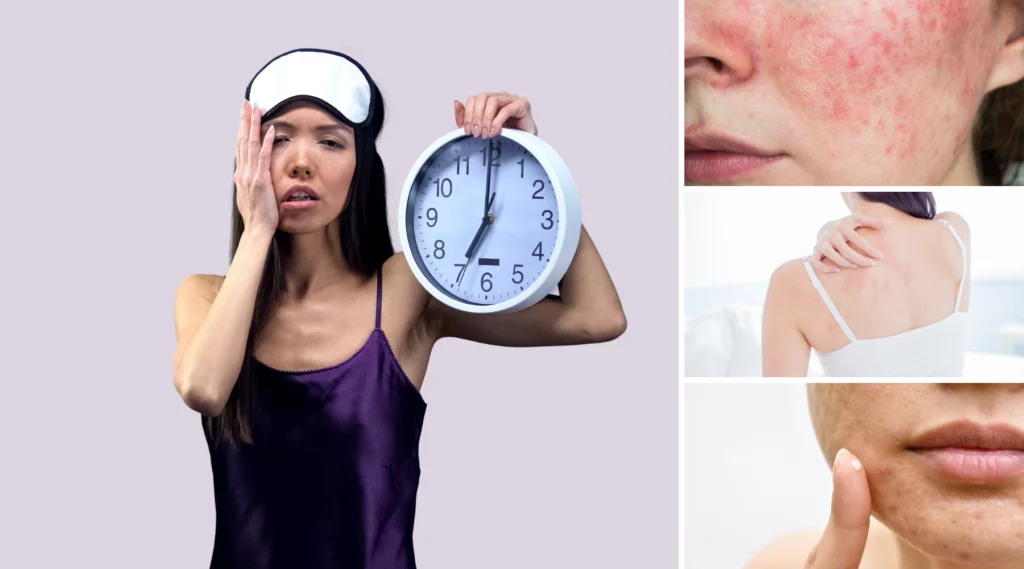
Sleep plays a vital role in maintaining healthy, youthful skin by promoting repair, regeneration, and protection. During deep sleep, skin cells renew, collagen is produced, and the barrier strengthens, preserving hydration and glow. Lack of sleep accelerates aging, dullness, dryness, and inflammation, while quality rest enhances natural repair and resilience.
Key Takeaways
- Sleep promotes collagen production, ensuring firmness and elasticity.
- Rest supports barrier strength, reducing dryness and irritation.
- Poor sleep raises cortisol, triggering inflammation and breakouts.
- Adequate rest improves circulation, giving skin a healthy glow.
- Chronic sleep loss speeds up wrinkles, puffiness, and dull tone.
- Quality sleep strengthens immunity and microbiome for better defense.
- Consistent sleep habits, stress control, and night skincare boost repair.
The Science Behind Sleep and Skin Processes
During sleep, the body enters a repair mode. Skin cells regenerate, and important hormones that affect skin health like growth hormone are released. These processes promote cell turnover and help repair damage caused by daily exposure to sun, pollution, and stress. Sleep deprivation interrupts these cycles, slowing down the skin’s ability to heal and renew itself.
Key points about sleep and skin regeneration include:
- Sleep helps increase production of new skin cells.
- Growth hormone released during sleep promotes tissue repair.
- Lack of sleep reduces skin’s natural repair abilities.
The Impact of Sleep on Skin Health

Quality sleep is essential for maintaining healthy, vibrant skin because it allows the body to activate crucial repair and regeneration processes. While we rest, our skin undergoes renewal, restores moisture, and strengthens its defenses against daily environmental damage. Without sufficient sleep, these vital functions slow down, leading to visible signs of aging, dullness, and increased sensitivity.
Collagen Production and Aging
Collagen is a protein responsible for skin’s firmness and elasticity. Quality sleep supports collagen synthesis. When sleep is inadequate, collagen production decreases, accelerating the appearance of wrinkles and sagging skin.
- Collagen provides skin’s firmness, elasticity, and smooth texture.
- Growth hormone released in deep sleep promotes collagen formation.
- Poor sleep leads to reduced collagen production and faster breakdown.
- Lack of collagen causes wrinkles, fine lines, and sagging skin.
- Consistent quality sleep supports youthful, resilient skin.
- Nighttime collagen-boosting skincare complements sleep benefits.
Skin Barrier Function and Hydration
The skin’s barrier protects against harmful elements like bacteria and chemicals while retaining moisture. Sleep affects how well this barrier performs. Without enough sleep, the skin’s barrier weakens, causing increased transepidermal water loss (TEWL), leading to dryness and irritation. Maintaining hydration is critical, and good sleep helps skin keep water where it’s needed for softness and suppleness.
Key facts about skin barrier and sleep:
- Sleep supports skin’s protective barrier function.
- Poor sleep increases moisture loss, causing dryness.
- Hydrated skin resists irritation and environmental damage.
Inflammation, Cortisol, and Skin Response
Sleep deprivation raises stress hormone levels, especially cortisol. Elevated cortisol triggers inflammation, which worsens skin problems like acne, eczema, and psoriasis. Chronic inflammation damages skin cells and can result in redness, swelling, and sensitivity. Managing cortisol through sufficient sleep reduces inflammation and promotes healthier skin.
Essential points on sleep, cortisol, and inflammation:
- Lack of sleep increases cortisol, the body’s stress hormone.
- High cortisol levels promote skin inflammation.
- Sleep supports inflammation reduction and skin healing.
Blood Flow, Oxygen, and Skin Tone
Healthy skin requires good blood circulation to deliver oxygen and nutrients. During deep sleep, circulation improves, revitalizing the skin and giving it a natural glow. Without enough sleep, blood flow slows, causing dull, pale skin and visible tiredness.
Good sleep ensures vibrant skin tone and vitality.
Important points about circulation and sleep:
- Sleep enhances blood flow to skin.
- Reduced circulation from sleep loss leads to dull complexion.
- Proper blood flow supports nutrient delivery and repair.
Dark Circles, Eye Puffiness, and Fatigue Signs
Dark circles and puffiness around the eyes are common signs of sleep deprivation. These occur due to poor circulation and fluid buildup in delicate tissues. Lack of sleep makes these issues more noticeable and contributes to a fatigued appearance.Combating these effects requires prioritizing restful sleep.
Key facts on sleep and under-eye concerns:
- Poor sleep causes fluid retention and dark circles.
- Reduced circulation worsens eye puffiness.
- Restful sleep minimizes visible fatigue signs.
Immune System, Microbiome, and Skin Defense
The skin is a critical immune organ. Sleep strengthens the immune system, enhancing skin’s ability to fight infections and repair damage. Additionally, sleep impacts the skin microbiome, the community of bacteria living on skin helping maintain balance that prevents conditions like acne or eczema. Prioritizing sleep promotes defense mechanisms essential for skin health.
Essential facts:
- Sleep boosts skin’s immune function.
- A healthy microbiome relies on adequate sleep.
- Sleep deprivation weakens skin’s defenses.
Chronic Sleep Disorders and Long-Term Skin Health

Chronic conditions like sleep apnea cause repeated interruptions in sleep, severely impacting skin health. These disorders accelerate aging, worsen inflammation, and impair skin quality over time. Managing chronic sleep problems is important for both overall wellness and skin appearance.
Key points on chronic sleep disorders:
- Sleep disorders disrupt skin repair and renewal.
- Prolonged poor sleep leads to premature skin aging.
- Treatment of sleep issues supports skin recovery.
Psychological and Social Effects of Poor Sleep on Skin Appearance
Lack of sleep affects not only physical but psychological well-being. Tired skin can impact self-esteem and social interactions. People often perceive sleep-deprived individuals as less attractive and less healthy. Understanding this impact highlights the importance of sleep for confidence and social presence.
Key social and psychological points:
- Sleep affects perceived attractiveness.
- Poor sleep can reduce self-confidence.
- Healthy skin from good sleep supports better social wellbeing.
Lifestyle, Diet, and Sleep Hygiene for Better Skin
Managing stress and maintaining a calming bedtime routine is especially important for younger individuals developing healthy habits as highlighted in skin care tips for teenagers.
Aligning skincare routines with sleep cycles also helps. For example, men’s skincare routines can be tailored with restorative nighttime products that work synergistically with the body’s repair mode.
Simple steps to improve sleep and skin:
- Maintain consistent sleep and wake times.
- Create a calming pre-sleep routine.
- Avoid caffeine and screens before bedtime.
- Eat skin-friendly foods like fruits, vegetables, and healthy fats.
Improving Sleep for Improved Skin Health
Optimizing sleep benefits skin in multiple ways. Practicing relaxation techniques such as meditation or deep breathing enhances sleep quality. Keeping bedrooms dark, cool, and quiet supports uninterrupted rest.
Align skincare routines to complement sleep cycles, using gentle, nourishing products at night to assist natural repair. Practical tips for better sleep and skin:
- Meditate or practice breathing exercises before bed.
- Use blackout curtains and maintain cool temperatures.
- Apply night creams with restorative ingredients.
- Avoid heavy meals or intense exercise late at night.
Conclusion
Quality sleep is essential for skin repair and regeneration. It boosts collagen production, strengthens the skin barrier, and maintains hydration. Poor sleep increases inflammation, dryness, and accelerates aging signs like wrinkles and dullness. Sleep loss also worsens dark circles, puffiness, and skin conditions such as acne and eczema.
Good sleep hygiene, stress management, and a nutrient-rich diet improve skin health. Nighttime skincare products further support repair processes. Addressing chronic sleep disorders is key to preserving skin quality. Overall, restful sleep is vital for maintaining a clear, youthful, and healthy complexion.
FAQs
How does lack of sleep affect skin aging?
Sleep deprivation reduces collagen and increases oxidative stress, accelerating wrinkles and sagging.
Can poor sleep worsen acne or eczema?
Yes, higher cortisol from poor sleep promotes inflammation that can trigger or worsen skin conditions.
Why do dark circles appear after little sleep?
Reduced circulation and fluid retention cause visible darkness and puffiness under the eyes.
How much sleep is ideal for healthy skin?
7 to 9 hours of uninterrupted sleep is optimal for skin regeneration.
Can improving sleep reverse skin damage?
Better sleep improves repair processes but cannot fully reverse long-term damage.
How is the skin’s barrier related to sleep?
Good sleep strengthens the barrier, reducing moisture loss and protecting from irritation.
What role does stress play in skin problems from sleep loss?
Stress hormones released during poor sleep increase inflammation and breakouts.
Do sleep disorders cause permanent skin changes?
Chronic sleep disorders can accelerate aging and reduce skin quality over time.
Should people with skin conditions prioritize sleep hygiene?
Yes, good sleep supports healing and reduces flare-ups.
Are there ingredient recommendations for nighttime skin care?
Ingredients like retinol, peptides, and antioxidants support skin repair during sleep.
Reference
- Walk-in Dermatology – How Does Lack of Sleep Affect the Skin?
https://walkindermatology.com/how-does-lack-of-sleep-affect-skin/ - Art of Dermatology – How Sleep Affects The Skin
https://artofdermatology.com/how-sleep-affects-the-skin/ - Healthline – How Adequate Sleep is Vital for Healthy, Bright, Glowing Skin
https://www.healthline.com/health/sleep-and-skin-explained - Sleep Foundation – Beauty Sleep: Why Rest and Relaxation Impact Appearance
https://www.sleepfoundation.org/physical-health/beauty-sleep - The Ordinary – How Sleep Deprivation Accelerates Skin Ageing
https://theordinary.com/en-us/blog/impact-of-sleep-on-skin-ageing.html - Skin and Cancer Institute – The Connection Between Sleep and Skin Health
https://skinandcancerinstitute.com/sleep-and-skin-health-connection/ - Vujevich Dermatology – Beauty Sleep: How Sleep Affects Skin
https://www.vucare.com/2019/03/04/beauty-sleep-skin/
Aubrey Carson is an RDN with 9 years across hospital, outpatient, and private practice settings. They earned an MS in Clinical Nutrition from Tufts University – Friedman School (2016) and completed a Dietetic Internship at Mayo Clinic. Aubrey specializes in micronutrient assessment, evidence-based supplementation, and patient education. Their work includes CE presentations for the Academy of Nutrition and Dietetics and collaborations with Mass General Brigham on nutrition education resources.

